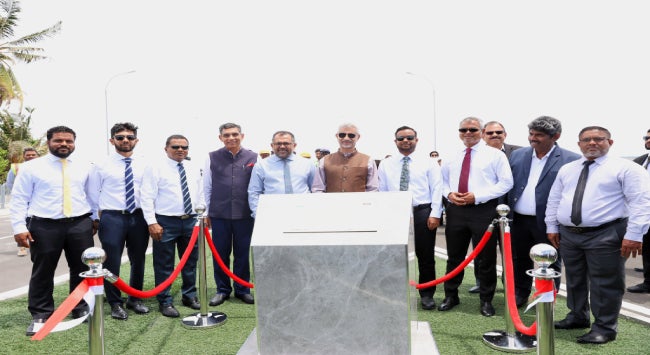Summary
During the visit to Malé from 9 to 11 August 2024, India’s External Affairs Minister S Jaishankar reiterated India’s stand on how significant the archipelago nation is to New Delhi. However, it is too early to say that the India-Maldives relations will attain a similar height as they were under the presidency of Ibrahim Mohamad Solih (2018-2023).
India’s External Affairs Minister S Jaishankar’s trip to the Maldives from 9 to 11 August 2024 followed the visit of the Maldives’ President Mohamed Muizzu to New Delhi to attend the third consecutive swearing-in ceremony of the Narendra Modi-led government in June 2024. Before Muizzu, Moosa Zameer, Minister of Foreign Affairs of the Maldives, made a visit to New Delhi on 8 May 2024.
In January 2024, ties between the two countries plummeted following derogatory remarks made by three Maldivian deputy ministers – Malsha Shareef, Mariyam Shiuna and Abdulla Mahzoom Majid – against Modi. They described Modi as a “clown”, “terrorist” and “puppet of Israel” on social media platform X. While the deputy ministers were subsequently suspended, the damage was already done to Maldivian tourism, for which India had been a major market. India was the top tourist market for the Maldives in 2023 but slid to sixth position by July 2024 due to the strain in their bilateral ties.
In a bid to re-attract Indian tourists, in July this year, the Maldives Marketing and Public Relations Corporation, the Maldives Association of Travel Agents and Tour Operators and the National Hotel and Guesthouse Association of Maldives jointly held ‘Welcome India’ roadshows in some of the major Indian cities such as New Delhi, Mumbai and Bengaluru. The Maldivian delegation was led by Tourism Minister Ibrahim Faisal and Advisor to the President on Tourism Development, Mohamed Khaleel. In New Delhi, Faisal also met the Indian tourism minister, Gajendra Singh Shekhawat.
In such a situation, Jaishankar’s visit held significance. During his visit, in a press statement, the Indian external affairs minister stated that “[the] Maldives is one of the cornerstones of our [India’s] ‘Neighborhood First’ policy, it is also one of our Vision SAGAR [Security and Growth for All in the Region] as well as of our commitment to the Global South.” He jointly inaugurated a water and sanitation project worth US$110 million (S$146 million), commissioned under the Indian Line of Credit (LoC). He and Zameer also inaugurated projects on health education-related units and streetlights in different towns and atolls. Jaishankar also discussed various aspects of the India-Maldives bilateral ties, including development partnership, defence and maritime corporation, capacity building, economic and trade ties, and people-to-people linkages. India and the Maldives also signed the memorandum of understanding (MoU) between the National Centre for Good Governance and the Civil Service Commission for an additional 1,000 slots for training Maldivian civil servants. The two countries exchanged a MoU to introduce India’s Unified Payments Interface payment method in the Maldives. Moreover, Jaishankar mentioned that India will soon be hosting the third Voice of the Global South Summit and is looking forward to the Maldives’ participation in the event. In Malé, he also underlined the pattern of India-Maldives development cooperation as “Imagined by [the] Maldives, Delivered by India”.
In Addu, Jaishankar stated that in the last few years, India has invested around US$220 million (S$298 million) in various projects in the atoll. India has also partnered the Maldives on the Addu Reclamation and Shore Protection Project, which was inaugurated during the visit. The project would help the region’s overall growth, creating better opportunities for employment, entrepreneurship and trade. Another important project in Addu with Indian assistance is the redevelopment of the Addu roads and drainage development at a cost of US$70 million (S$93 million). Once completed, the project will solve water logging problems and roads in Addu.
During the visit, the Addu Detour link road was also inaugurated. Under the Indian LoC, the Maldives is redeveloping Gan International Airport. Once completed, the airport will connect the southern atolls of the Maldives with the world. Jaishankar also said that India and the Maldives are partnering on 65 projects, of which 12 are in Addu. He also visited the site of the Greater Malé Connectivity Project, which is a flagship project of India in the Maldives. The 6.73 kilometre-long bridge and causeway link is between the islands of Malé, Villingili, Gulhifalhu and Thilafushi in the Maldives. Works on India supported Hanimaadhoo Airport Redevelopment Project is “underway” and construction activity on 4,000 housing units in Hulhumalé is “progressing well”.
In the Maldives, Jaishankar also met a delegation from the Maldivian Democratic Party (MDP), led by its president and former foreign minister, Abdulla Shahid. Following the meeting the MDP came out with a statement, stating Muizzu’s government has suddenly recalibrated its foreign policy from an ‘India Out’ campaign, stoking an anti-India sentiment in the country. The MDP asked Muizzu to make a public apology for deceiving the people about India. The MDP added that it welcomes the government’s switch from ‘India Out’ to ‘Welcome India’. Refuting such a switch, speaking to a reporter from Adhadhu, Muizzu said that his government has not recalibrated its foreign policy and there was, therefore, no need to apologise to the people. He added, “I am implementing the same foreign policy announced in my manifesto”.
The bilateral visits and India’s assistance in building civic projects in the Maldives may warm up the ties between the two countries. However, it is too early to say if New Delhi-Malé relations will reach the height they witnessed during the presidency of Ibrahim Mohamed Solih with his ‘India First’ policy.
. . . . .
Dr Amit Ranjan is a Research Fellow at the Institute of South Asian Studies (ISAS), an autonomous research institute at the National University of Singapore (NUS). He can be contacted at isasar@nus.edu.sg. The author bears full responsibility for the facts cited and opinions expressed in this paper.
Pic Credit: Twitter
-
 More From :
More From :
-
 Tags :
Tags :
-
 Download PDF
Download PDF



